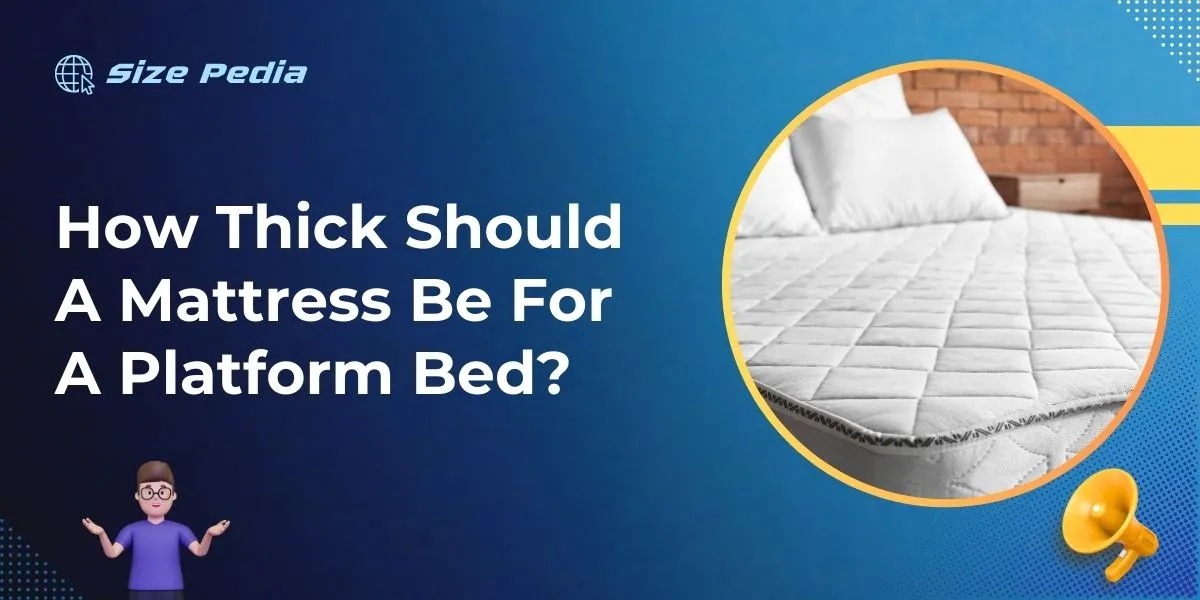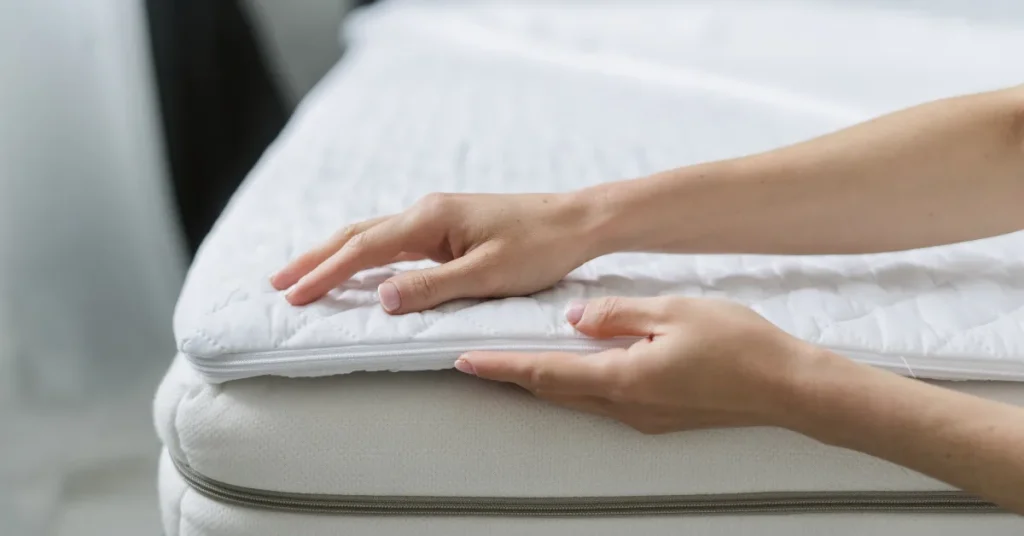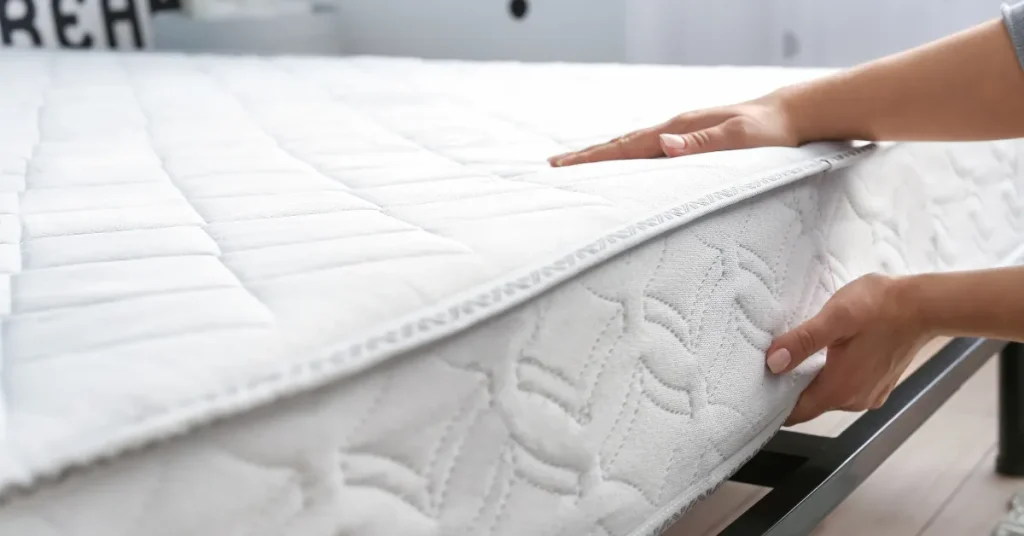A mattress for a platform bed should typically be 8 to 12 inches thick. Optimal thickness ensures proper support and comfort levels.
Shopping for the perfect mattress to complement your platform bed requires understanding the best thickness for both support and comfort.
Platform beds are favored for their low-profile, sturdy bases that can support a mattress without the need for a box spring.
The thickness of your mattress is a crucial factor that can affect the quality of your sleep and the overall aesthetics of your bed setup.
A mattress that is too thin might not provide adequate cushioning, while one that is too thick could look disproportionate and may even make getting in and out of bed a challenge.
Keep these key points in mind to choose a mattress that delivers a restful night’s sleep and fits seamlessly with your platform bed’s design.
Remember to consider the material and composition of the mattress as well, as these aspects also contribute to overall thickness and comfort.

Ideal Mattress Thickness For Platform Beds
Finding the right mattress thickness for a platform bed ensures comfort and durability. It must complement the bed’s design for sleep quality. This guide will help choose that perfect mattress.
Factors Influencing Mattress Thickness
- Body Weight: Heavier individuals may prefer thicker mattresses for extra support.
- Height of Bed Frame: Higher frames allow for thicker mattresses.
- Personal Preference: Some prefer a plush feel, opting for thicker options.
- Age and Mobility: Thicker mattresses can be easier for older adults to get in and out of bed.
Pros And Cons Of Thick Vs. Thin Mattresses
| Thickness | Pros | Cons |
| Thick (over 10 inches) | More support for jointsBetter for heavier individualsLonger lifespan | Heavier and harder to moveMay retain more heatCan be pricier |
| Thin (6-9 inches) | Lower profile fits modern aestheticsEasier to move and handleMore affordable | Less support for jointsMay not last as longNot ideal for heavier people |
A perfect balance is key with platform beds. Generally, an 8 to 12-inch thick mattress strikes that balance. This thickness range supports different weights and preferences. Always consider the platform bed specifications for the best fit and support.
Types Of Mattresses And Their Thickness Levels

Finding the right mattress isn’t just about comfort. It’s also about the proper fit for your platform bed.
Different types of mattresses come with their own recommended thickness levels that are vital for support and durability. Let’s explore the mattress types and their ideal thickness measurements.
Memory Foam Mattresses
Best suited for contouring and pressure relief, memory foam mattresses have varying thicknesses:
- Standard thickness ranges from 6 to 14 inches.
- Ideal thickness for a platform bed is typically 10 inches.
- Thicker models ensure deep support, while thinner options cater to minimalistic setups.
Innerspring Mattresses
Innerspring mattresses are traditional and known for their bounciness:
- Common thickness starts at 5 inches and goes up to 12 inches.
- The 8-inch thickness is often enough for platform beds.
- They work well with various thickness levels without compromising the bed structure.
Hybrid Mattresses
Hybrid mattresses blend foam and inners aspring coils for a balanced feel:
- Most models are between 10 to 14 inches thick.
- A minimum of 10 inches is recommended on a platform bed for comfort and support.
- Thicker hybrids provide better motion isolation and longevity.
Latex Mattresses
Latex mattresses present a natural and responsive alternative:
- They typically range from 6 to 13 inches in thickness.
- 9 inches is the sweet spot for platform beds.
- Choose thicker for more cushioning or thinner for firmer support.
Note: Regardless of the type, thickness affects the mattress’s feel, support, and compatibility with a platform bed frame. Always ensure the mattress height complements the bed design and personal comfort preference.
Impact Of Sleep Position On Mattress Thickness
Choosing the right mattress thickness for a platform bed can greatly affect your comfort and sleep quality.
Your preferred sleep position plays a critical role in determining the ideal mattress thickness. A mattress that supports the body’s natural alignment promotes restorative sleep.
Best Thickness For Side Sleepers
Side sleepers typically require a thicker mattress to ensure adequate support and pressure relief. Look for a mattress with a thickness range of 10 to 14 inches. This allows for proper contouring to the hips and shoulders, aligning the spine effectively.
- Soft to Medium firmness: Cushions pressure points.
- Memory foam or hybrid: Offers dynamic support.
Recommended Thickness For Back Sleepers
Back sleepers need a mattress that supports the lower back while keeping the spine in a neutral position. 8 to 12 inches thick mattresses are generally sufficient for back sleepers, balancing comfort with support.
- Medium firmness: Maintains spinal alignment.
- Hybrid or innerspring: Provides a firmer surface.
Optimal Thickness For Stomach Sleepers
Stomach sleepers require a thinner, firmer mattress to avoid sinking of the abdomen, which can lead to lower back pain. Aim for a mattress thickness between 6 to 10 inches.
- Firm surface: Prevents deep sinking.
- High-density foam: Offers even support.
Importance Of Support And Comfort Layers
Choosing the right mattress thickness for a platform bed is crucial. It can affect sleep quality.
The mattress must provide enough support and comfort. These two components work together for restful sleep. A well-structured mattress supports the spine and relieves pressure points.
Role Of Base Layers In Platform Beds
The base layer, or support core, is fundamental on a platform bed. Platform beds have a solid or slatted base which requires a sturdy mattress. The base layer ensures durability and prevents sagging.
Its thickness should be sufficient to withstand weight over time. Typically, high-density foam, durable springs, or a combination of both form this layer. This solid foundation distributes weight evenly across the bed.
Comfort Layer Characteristics
- Made from soft materials for cushioning.
- Contours to the body for pressure relief.
- Varies in thickness for different comfort levels.
- Can include memory foam, latex, or pillow tops.
A comfort layer on top of the base layer provides softness for the sleeper. The comfort layer must be thick enough for cushioning without sinking. It aims to cushion the body, allowing muscles to relax.
Details like material type and layer thickness define the mattress’s feel and quality. Balancing these layers results in a comfortable, supportive sleep surface.
Matching Mattress Thickness With Platform Bed Design
Choosing the right mattress thickness is essential for a platform bed. Mattresses that sit perfectly with the bed frame complement the bedroom’s decor. They also ensure a comfortable sleep. Keep bed height and aesthetics in mind.
Make sure to consider weight capacity. This guides you toward the mattress that best suits your platform bed.
Considering Bed Height And Aesthetics
A well-chosen mattress height enhances a platform bed’s design. It should allow easy access in and out of bed. High beds can make a statement in a room. A mattress that is too thick or too thin can look out of place. Aim for balance and proportion in your bedroom setup.
- Standard bed height: Most beds are about 25 inches high.
- Optimal mattress thickness: A thickness between 8-12 inches often works well.
- Climbing in and out: Ensure the thickness is not too challenging.
Weight Capacity Considerations
Platform beds differ in support and weight limits. Heavier mattresses need sturdy frames. Check the weight capacity of your platform bed before buying a mattress. This will help you avoid damage and ensure longevity.
| Mattress Type | Average Weight |
| Foam | 50-75 lbs |
| Innerspring | 60-80 lbs |
| Hybrid | 75-100 lbs |
Remember to account for the combined weight of sleepers too. Select a mattress that supports everyone comfortably without straining the platform bed.
Additional Considerations For Mattress Selection

Choosing the perfect mattress for a platform bed goes beyond thickness. It involves several other factors.
Considering room size and space, the preferences of anyone else sharing the bed, and the durability of the mattress will guide you to make the best selection.
Room Size And Space
The size of your room should influence your mattress choice. A large mattress in a small room can overwhelm the space, leaving little room for other furniture. On the other hand, a tiny mattress might look out of place in a vast room. Aim for balance.
- Small Room: Opt for a slim, more compact mattress.
- Large Room: Consider a thicker, luxurious mattress.
Sleeping Partner Preferences
If you share your bed, factor in your partner’s comfort preferences. Discuss the firmness level that suits both of you.
A mattress that works for one person might not be comfortable for the other. Ensure joint decision-making for a restful night’s sleep.
- Firmness: Blend of both preferences is key.
- Motion Isolation: Essential for undisturbed sleep.
Durability And Longevity Expectations
Expect your mattress to last. High-quality materials might mean a thicker mattress, but they also promise durability. Look for indicators of longevity such as warranties, brand reputation, and material integrity. Your investment should stand the test of time.
| Material | Expected Longevity |
| Memory Foam | 7-10 Years |
| Latex | 8-12 Years |
| Innerspring | 5-7 Years |
| Hybrid | 6-8 Years |
FAQs About How Thick Should A Mattress Be For A Platform Bed
What Kind Of Mattress Do I Need For A Platform Bed?
A platform bed supports any mattress type, including foam, latex, or innerspring, without needing a box spring. Opt for a mattress that aligns with your comfort preferences and fits the platform’s size.
Do I Need A Special Mattress For A Platform Bed?
No special mattress is necessary for a platform bed; any mattress type should work well, as long as it fits the bed frame’s size.
Is A 14 Inch Mattress Thick?
Yes, a 14 inch mattress is considered thick, providing substantial cushioning and support for sleepers.
Is A 7 Inch Mattress Thick Enough?
A 7 inch mattress can provide adequate support for children or lighter adults but may be insufficient for heavier individuals or those seeking plush comfort. Consider sleep habits and comfort preferences before choosing.
Conclusion
Selecting the ideal mattress thickness for a platform bed ensures both comfort and support. Aim for 8 to 12 inches, balancing personal preference with bed frame compatibility.
Remember, the right choice contributes to restful sleep and the longevity of your mattress.
Sweet dreams await with your perfect mattress fit!
Resources:
1. https://www.fda.gov/medical-devices/hospital-beds/covers-hospital-bed-mattresses-learn-how-keep-them-safe
